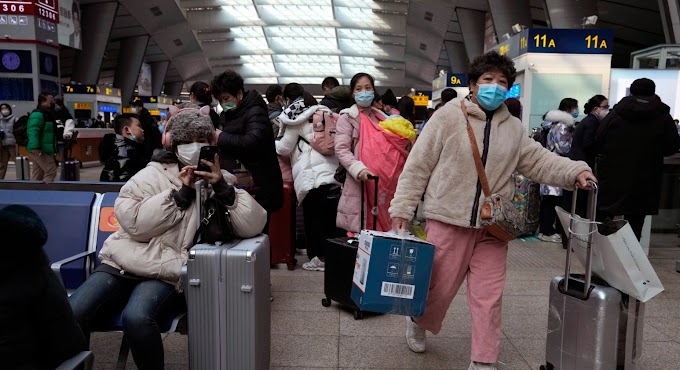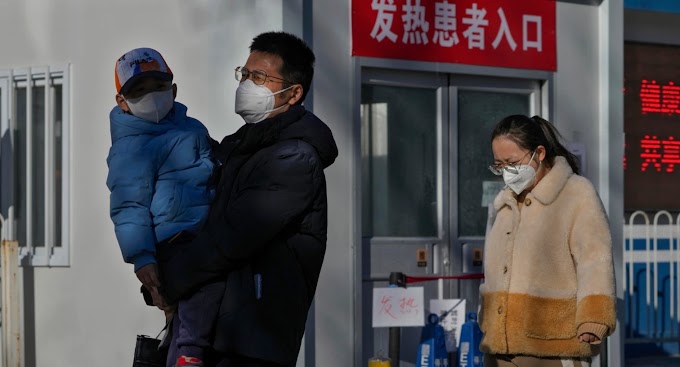The US-Africa summit ended, Washington offered Africa a better strategic choice than China
 |
| On December 13, 2022, the US Secretary of State met with the Ethiopian Prime Minister and his party who were visiting to attend the US-Africa Summit. (Reuters) |
WASHINGTON —
The U.S. and nearly 50 African leaders just concluded the three-day U.S.-Africa Summit in Washington. and deepened partnerships with African governments and non-governmental organizations. The United States has promised to provide at least US$55 billion in aid to Africa in the next three years and announced that President Biden will set off on a historic visit to Africa next year.
As the United States and China are deeply involved in competition and games, this summit is considered to be a large-scale international meeting of great strategic significance for the United States to revive its relations with African countries and counter China's influence. Our world is changing rapidly, and U.S. engagement in Africa must evolve with it, the White House said in a statement Thursday after the summit.
This is the first large-scale international conference held in the United States since the COVID-19 pandemic, with the participation of more than 40 heads of state. In the past few days, local universities, think tanks, and business groups in Washington have held various conferences with a wide range of topics one after. Among them A lot of it involves the president or the ministerial level, said David Shinn, an adjunct professor at George Washington University's Elliott School of International Affairs. All of Washington is talking about Africa right now.
Calling for a broad new partnership between Africa and the United States, President Biden signed a memorandum of understanding with the African Continental Free Trade Area (AfCFTA) secretariat to expand the relationship between the two trade and attract investment on the African continent. Once fully implemented, the Agreement Establishing the African Continental Free Trade Area would create a continent-wide market of 1.3 billion people and a $3.4 trillion market, making it the world's fifth-largest economy, a White House statement said.
African voices, African leadership, and African innovation are all critical to addressing the most pressing global challenges and realizing our shared vision: a world that is free, open, prosperous, and secure, President Biden said.
President Biden once again reiterated the United States support for African countries to have permanent seats on the Security Council, emphasizing that the challenges facing the world cannot be solved without African leadership. In his speech at the 77th session of the United Nations General Assembly in September this year, President Biden proposed that in order to ensure the credibility and effectiveness of the Security Council, the United States supports increasing the number of permanent members of the Security Council and supporting permanent seats for African countries.
In addition to President Biden's trip to Africa, the summit also announced that several senior officials of the US government will also visit southern African countries, including Secretary of State Blinken, Treasury Secretary Yellen, and Commerce Secretary Raimondo. The U.S. Treasury Department announced Friday that Yellen will visit Senegal, Zambia, and South Africa from January 17 to 28 next year.
I think this is a sincere effort by the Biden administration to revive U.S.-Africa relations, David Shinn, a professor at George Washington University and former U.S. ambassador to Ethiopia, told VOA. From a U.S. foreign policy standpoint, in general, I don't think it (the summit) is extremely prominent because Africa has never been as important to the U.S. as most of the rest of the world. If you look at my relationship with the U.S. and Africa When you look at it from a perspective, it’s very important.
Chinese shadow
Although the United States regards China as its biggest long-term competitor and the only country with the ability and resources to try to replace the influence of the United States in the world, Biden has avoided mentioning China in many speeches over the past few days and in White House statements.
However, one of the biggest focuses of public opinion in the past few days is that the United States is facing a situation of sharply declining influence in Africa and China's rapidly expanding influence.
The media generally talks about China's role in the US-Africa leaders' summit. said Shinn, who has served as a diplomat in Africa for more than 30 years. And the summit itself is doing everything it can, including the Biden administration, to keep China off the agenda and focus on the relationship between the United States and Africa without considering China. The role of China cannot be ignored in the larger context, but this summit is not aimed at China. The summit has tried its best to make it a diplomatic event between the United States and African countries. In fact, the United States and China also have many common interests in Africa.
However, on the other hand, the former American diplomat who served as a diplomat in Africa for more than 30 years said that in the past few days he participated in some discussions, everyone was talking about China.
Even before the summit, a report by the U.S. Institute of Peace said the summit would discuss a wide range of issues, from food security to global health to education. While this is a summit on U.S.-Africa relations, and while China is not on the formal agenda, the U.S.-China rivalry and its implications for Africa will be the backdrop for this major diplomatic event, the report said, which will certainly be discussed in private conversations at the summit. Discussion and analysis, Thomas P. Sheehy, a fellow in African affairs at the institute, said in the report.
The Associated Press analyzed on the first day of the summit with the title China casts a shadow over the summit of US-African leaders. A not-so-subtle suggestion emerges from the economic competition: The United States offers better alternatives to its African partners.
Ebenezer Obadare, a senior fellow at the Council on Foreign Relations, said in an interview with Voice of America that the United States felt the pressure to give up competition with China in Africa and had to respond. Given China's growing influence in Africa, the summit may not be primarily about China, but every panel discussion cannot do without China, he said.
Although this time trying to avoid talking about China, the United States stated in its strategy for the sub-Saharan region announced in August this year that the world is keenly aware of the importance of Africa, prompting countries to expand political, economic and security contacts with Africa. China (PRC) sees the region as an important arena, challenges the rules-based international order, advances its narrow commercial and geopolitical interests, undermines transparency and openness, and weakens U.S. cooperation with America's relationship with African peoples and governments.
Analysts said the United States was careful not to interpret the summit as an attempt by Washington to draw the countries into a geopolitical struggle, and did not want African countries to feel like they were taking sides.
Adams Bodomo, a professor of African studies at the Department of African Studies at the University of Vienna, said in an email to VOA that most of the countries attending the summit want to have good relations with the United States, but they Don’t want to sacrifice relations with countries like China and Russia.
America regains influence
The United States held its first summit during the Obama administration in 2014, and it has been eight years since that historic heavyweight diplomatic action. In contrast, China has regularly held the Forum on China-Africa Cooperation with 53 of the 55 member states of the African Union every three years since 2000. In addition, for more than two decades, the first foreign visit of the Chinese foreign minister every year The practice is all African countries.
In 2017, China built its first overseas military base in Djibouti, located on the west coast of the Gulf of Aden in northeastern Africa. The U.S. Department of Defense report on Chinese military power pointed out that China may have considered establishing military access bases in 13 countries, including African countries such as Angola, Kenya, Seychelles and Tanzania.
In the field of trade, except for the impact of the epidemic in 2020, the trade volume between China and Africa has declined compared with the previous year, the trade volume between China and African countries has been increasing year by year for many years, and it has remained Africa's largest trading partner for 13 consecutive years since 2009. Last year, the bilateral trade volume reached a record high of US$254 billion.
 |
| Total trade volume between China and Africa from 2017 to 2021 |
By comparison, U.S. imports from Africa stood at $62.4 billion in 2009 and nearly $37.6 billion last year. Although the first summit in 2014 was a sensation at the time, it was far from satisfactory in terms of trade volume. In the past 8 years, the trade volume between the two sides has not increased but decreased. It was 72.7 billion US dollars in that year, and it will drop to 64.3 billion US dollars in 2021.
According to Chinese official figures, by the end of 2021, among the 53 African countries that have established diplomatic relations with China, 52 countries and the African Union Commission have joined the Belt and Road Initiative, and Chinese companies have added and upgraded more than 10,000 kilometers of railways in Africa. There are nearly 100,000 kilometers of roads, nearly 1,000 bridges, nearly 100 ports, and so on.
In terms of infrastructure, the United States cannot catch up with China's large-scale investment in Africa. Professor Boydon of the University of Vienna said.
Despite this, Shine, an adjunct professor at George Washington University, said that what people often overlook is that most of China's aid is loans, which of course help local development, but there is interest and must be repaid. The United States provides more aid that does not have to be repaid. As the country that provides the most free aid of any country on the African continent, the United States has 11 billion US dollars in humanitarian aid this year alone. China does not publish figures in this regard, but academic Estimates are at most around $150 million.
Ambassador Sheehan also pointed out that the difference between the US and China in trade with Africa is that in China's trade, most of the trade is China's sales to Africa, rather than Africa's sales to China. There is a large trade deficit with China, and the US-Africa trade Admittedly much smaller, but Africa has a trade surplus with the US. He said: This is a major difference, and sometimes I really resent when my Chinese friends keep telling me how big China-Africa trade is and how insignificant America's trade with Africa is, yes, that's right, because You sell too much to Africans, and you make money in Africa.
Sheehan emphasized that the United States is fully capable of competing with China, and in fact is already competing.
A phenomenon in Africa that has concerned many observers in recent years has been the retreat of democracy in sub-Saharan Africa. A report by the Council on Foreign Relations says more Africans live under fully or partially authoritarian regimes than in most of the past two decades.
The NGO Freedom House identified just eight countries in Africa as free in its 2021 report. In September this year, Western countries and human rights organizations condemned China on the human rights issue of Uighurs in Xinjiang, but most African countries chose to remain silent. When China issued a joint statement slamming its assessment of Xinjiang as based on false information and drawing erroneous conclusions, 28 countries signed in support of China, with nearly half of the supporters coming from Burundi, Cameroon, Comoros, Egypt, Equatorial Guinea, Guinea, Eritrea, Ethiopia, Sierra Leone, South Sudan and Zimbabwe and other African countries.
It's surprising how many of them see China as a role model, said Shine, a former ambassador to Burkina Faso and Ethiopia. Because these African governments are authoritarian, they also look to other governments that are also authoritarian.







